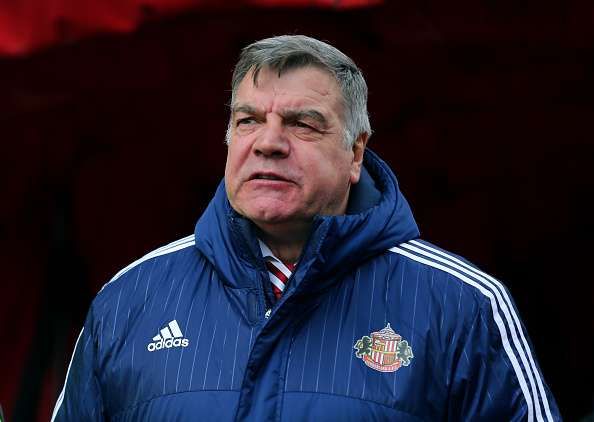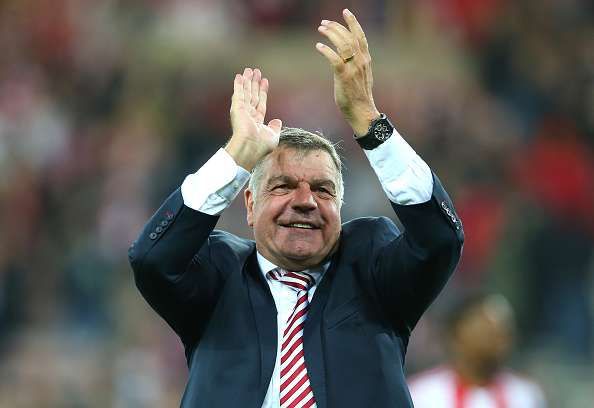
Sam Allardyce becomes the FA’s uncertain answer to an uncertain question
There was a certain ambiguity over how the Football Association set out to replace Roy Hodgson. The truth behind chief executive Martin Glenn’s claim that he was “not a football expert” soon became clear as his three-man FA panel set about interviewing Jurgen Klinsmann, Steve Bruce, Sam Allardyce and a fourth mystery candidate in the hope one of that uninspiring list of contenders would satisfy the requirements drawn up by Glenn, together with vice-chairman David Gill and technical director Dan Ashworth.
Glenn, projected into a manager search much quicker than he would have liked after taking over from outgoing chairman Greg Dyke, had said that his panel wanted a manager able to deal with what he claimed to be “the world’s most passionate press”, someone who was not a short-term mercenary and, most key of all, somebody willing to accept a brief that extends beyond the first team and into the younger age groups in the aim of building England an identity.
Also read: Allardyce ready for the 'big one', says Mourinho
It was a reasonable enough job hunt. Ashworth, together with Hodgson’s senior management team and the coaches that oversaw the national side down to under-16 level, had been working on a project that bore some fruits this summer in the form of Gareth Southgate’s under-21 side winning the Toulon tournament and Aidy Boothroyd’s under-19s making it to the semi-finals of the European Championships out in Germany.
That team contains many of the side that won the under-17 European Championship two years ago and the success of the young age groups suggests the hard work and planning invested in improving youth coaching at the FA’s St George’s Park is gradually paying off.
Tasked with cleaning up the mess left behind
After another shambolic effort from the seniors at a major international tournament, the FA’s remit was to find somebody who could find a recipe for success that has managed to evade an unforgivingly long list of coaches whilst continuing to smooth the pathway from younger levels into the senior group.
Allardyce has been deemed the man, the FA arriving at the decision to hand the 61-year-old Sunderland manager the job.
Whilst the pros are clear, Sam Allardyce will provide a safe pair of hands capable of restoring order to a team that fell into disarray in France in time for qualification for the 2018 World Cup, there seems to be an inescapable feeling that the former Bolton and West Ham boss, with only few playoff and minor league triumphs on his CV has been chosen as the best of a very mediocre bunch.
It says a lot about the disaster Roy Hodgson oversaw in France that the FA have had to turn pragmatist to replace him. One simply cannot imagine Allardyce taking a clearly unfit Jack Wilshere to a tournament or an inexperienced Marcus Rashford at the constant request of his assistant.
The prospect of the centre-forward endlessly lining up to waste free-kicks and corners will be anathema.
There is unlikely to be an admission to shoehorning players into a team on the eve of a European Championship whilst anybody familiar with Allardyce’s club teams won’t imagine England resembling the disorderly mess they were against Iceland under his guidance.
Establishing England a clear identity whilst shedding his own
Hodgson attempted to imprint a clear English identity, one of measured possession play, but succumbed to naivety in Brazil 2014 where a weak midfield was badly exposed in a first round exit, while out in France all the planning from a successful qualifying process was bizarrely abandoned as they prepared to fly out.
Those misjudgements and oversights will be eradicated under Allardyce but under a manager who parted from West Ham due to concerns over his unappealing style of play before last season guiding a rigid, reliant-on-set-pieces Sunderland to safety with an average of 40% possession, it will come at a cost to the possession-based philosophy honed in Southgate’s under-21s and by Hodgson during his four years in charge of the seniors.
Lingering on from his days in charge of a physical Bolton team and as a possible victim of a gradual shift in culture brought about by the growing influx of continental coaches and foreign methods into the Premier League, there is an established misconception that Allardyce is too wedded to an uncompromising style of kick and rush.

Whilst it is understandably synonymous with him, it can be argued that his reputation, sometimes unfair given that he is praised by his players for the quality of his video analysis and was one of the first in the league to use Prozone stats, is simply reflective of a career that has largely been spent managing limited sides that need to be reactive.
Though it remains to be seen if Allardyce will adopt a more pro-active, possession-based style with the luxury of having the best players in the country at his disposal, and if he doesn’t it will be intriguing to discover just how long the football that got him jettisoned from Newcastle after 8 months in charge, before a similar fate befell him at West Ham, will wash with 80,000 fans at Wembley.
The two clips of Allardyce doing the rounds on Wednesday night, his ripostes to Jose Mourinho’s “football from the 19th century” barbs and his thoughts on the ‘tiki-taka’ possession game; "all this tippy-tappy stuff - everybody keeps on going about the right way to play football - is all a load of b******s sometimes”, were certainly amusing but also a clear insight into the FA’s decision.
A manager that ticks some boxes but leaves a few worryingly blank
It is an appointment to please fans desperately seeking some sort of progress at tournaments after such a long wait but, strangely enough, not one that fits easily into the work done by Ashworth, Jamie Robinson (the FA’s head of elite coaching) and Southgate and co. on a technical level.
Allardyce’s strengths lie in attention to detail and meticulous planning, traits that bypassed Hodgson at vital moments that the FA can’t afford to witness again. The 61-year-old will bring his innovative methods of sports science and psychology to the international stage but there will be concern, until he manages to prove otherwise, that his abilities may not be enough to fulfil all areas of a multi-faceted job.
The FA have appointed an uncompromising organiser, a deep analyst who will not be easily swayed by the pressures of the media or by criticism. His imposing 6ft 3-inch frame will patrol the Wembley dugout in an England tracksuit as the proposed answer to the question nobody truly understood how to ask.
